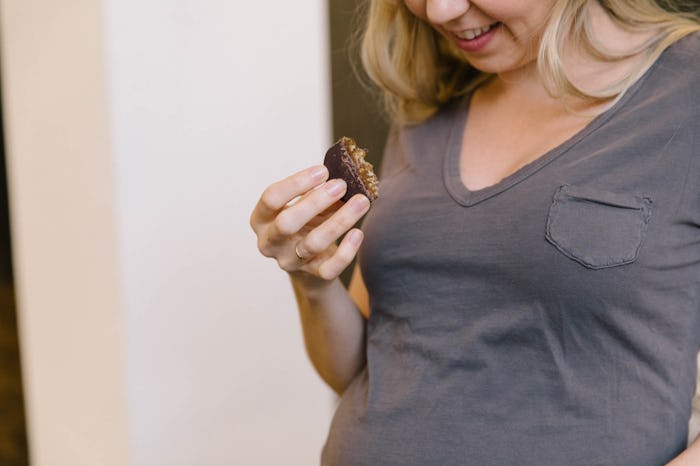Life
Those Hunger Pangs You Feel During Pregnancy Are There For A V. Important Reason
I gained a ton of weight during both of my pregnancies, and years later, I’m still struggling to shed those extra pounds. I’ll admit that I scarfed down french fries like there was no tomorrow, but the ravenous hunger I felt played a big part in my weight gain, too. You’ve heard of weird pregnancy cravings like pickles and ice cream, but you don’t hear much about those immense hunger pangs. If it feels like your hunger has no end in sight, you might wonder, why am I always so hungry while pregnant?
Well, for starters, you can blame it on all the amazing creation and growth going on inside you. According to Lamaze Certified Childbirth Educator (LCCE) and Fellow of American College of Childbirth Educators (FACCE) Deena Blumenfeld of Shining Light Prenatal Education, during pregnancy, your body is working extra hard, and the food you eat provides the calories you need to keep going. “A pregnant mom is using those calories all day and all night, even when she’s sleeping, to grow the baby and the placenta," she tells Romper.
Blumenfeld explains that all that growth takes fuel and energy, and that is where your hunger comes in. The calories you take in are the measure of energy (or fuel) your body needs to function progressively, and because you are using more energy during pregnancy, you’ll need more calories too. “A woman needs an additional 100 to 300 calories per day to grow and sustain a pregnancy,” notes Blumenfeld, “in addition to 40 to 60 plus ounces of water or other fluids per day.”
Hunger pangs usually begin around the second trimester, explained What To Expect, because most moms are just getting over their first trimester morning sickness. The article noted that you may feel hungrier throughout your second trimester, but by the third trimester, it may be curbed due to your baby getting bigger and leaving less space for your stomach. So even if you are feeling super hungry, the heartburn and indigestion of the third trimester may not let you eat that much anyway.
It’s easy to give in to all your cravings during pregnancy, especially if you’ve given yourself a free pass. But gaining too much weight can lead to health issues, noted What To Expect, and put you at risk for gestational diabetes, hypertension, labor and delivery complications. Despite your hunger, there are a few things you can do keep your weight gain in check. The article suggested eating a diet full of whole foods and nuts, keeping snacks on hand to curb your hunger pangs, and keeping your fridge stocked with healthy choices.
During pregnancy, you’re constantly hearing that you need to eat for two. Blumenfeld says that even though you are eating for you and your baby, you don’t have to eat twice as much food as you normally would. “Eating for two doesn't mean double the amount of food consumed, just a bit more.” She suggests that the best thing a pregnant mom can do is eat small, frequent meals throughout the day. This way you can keep your hunger at bay while you maintain a steady blood sugar and avoid feeling nauseated. You can even try to keep some fresh fruits or nuts on hand to satisfy your appetite without overdoing it.
Take it from me, giving in to your hunger pangs may feel great, but if you reach for unhealthy foods like I did, the weight you gain may stay with you longer than you anticipated. And if you are concerned about appetite and weight gain or loss during your pregnancy, make it a point to discuss it with your doctor and get the personalized advice and guidance you need for your individual situation.
Check out Romper's new video series, Bearing The Motherload, where disagreeing parents from different sides of an issue sit down with a mediator and talk about how to support (and not judge) each other’s parenting perspectives. New episodes air Mondays on Facebook.
